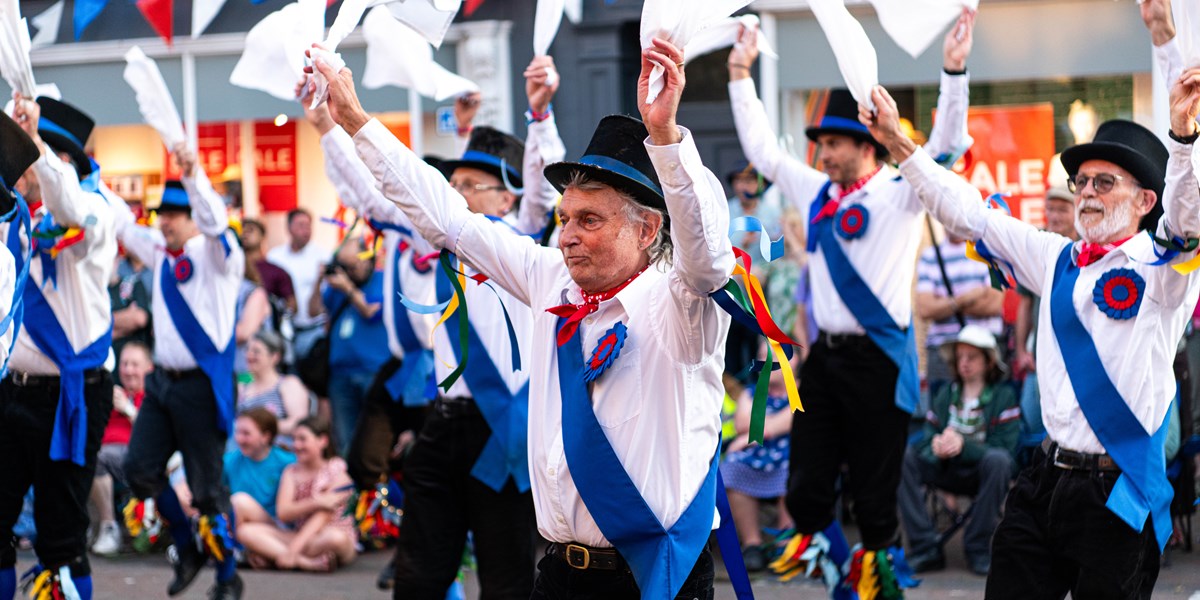Monday, March 24, 2025
National Folklore Survey for England launched to understand role of folk culture in modern England
The new National Folklore Survey for England project is focusing solely on traditional customs, beliefs and narratives

Great Western Morris at Sidmouth Folk Festival (2024)
Folklore is undoubtedly having a moment. From guising on BBC Radio Four courtesy of comedian Isy Suttie, to Charlie Cooper’s Myth Country docuseries on BBC Three, it seems that a newspaper can’t be opened, or a television or radio switched on, without a mention of folklore being far behind. And that’s before we consider the films, literature, video games and exhibitions that are being produced with some aspect of folklore at their core.
It’s the perfect time, it seems, to launch a survey to find out what folklore – which the American Folklore Society calls “our cultural DNA” – actually means to people: what customs they practice, what beliefs they have, and what stories they tell.
A brand-new project, funded by the Arts and Humanities Research Council and based at Sheffield Hallam University, hopes to do just that. The National Folklore Survey for England intends to provide robust data that will help us understand the cultural value of folklore in post-Brexit, post-pandemic, multicultural England – especially pertinent when we consider that historian and broadcaster David Olusoga believes that people in England have “a conflicted sense of identity.”
The project is led by Dr David Clarke, co-founder of the Centre for Contemporary Legend (CCL) and a world expert on UFOlogy and contemporary legend, and complemented by colleagues at Sheffield Hallam University (including myself, as a postdoctoral researcher), the University of Hertfordshire (home to England’s only degree programme in Folklore Studies) and Chapman University in California. The Folklore Society, The Folklore Library and Archive, and the Folklore Museums Network will further support the project.
Surveys of folklore have been attempted before, notably in the 1950s at University College London and between the 1960s and 1990s at the University of Sheffield, when huge quantities of qualitative data – stories, testimonies, opinions – were gathered. But the vastness of these collections led to little, if any, interpretive analysis, and much of the data resides in archives untouched.
The new National Folklore Survey for England project reins in its approach, focusing solely on traditional customs, beliefs and narratives, recognising that other aspects of folklore are well advocated by specialist bodies, such as the English Folk Dance and Song Society (EFDSS). It also, as the title makes plain, spotlights the folklore of England only. It will work with Ipsos, a well-known polling and market research organisation, used by the NHS and the UK government among many other high-profile clients, to survey just under 2,000 people living across England using “random probability unclustered address-based sampling”, meaning every household has a chance of being surveyed. Respondents will be stratified to ensure representative data by age, education level, region of the country, gender and income-level, while the sample size allows us to estimate population parameters within +/- 3 percentage points with a 99% confidence level – meaning we can be sure that this is a truly representative survey.
Before we can do that, we are busy writing the questions! Follow us in Songlines this year as we get the project off the ground and find out what England believes and how it engages with folklore.
A project website is currently under construction. For now, you can find out more about the project at contemporarylegend.co.uk/n-f-s/ and via Bluesky (@nfsengland.bsky.social) and X (x.com/nfsengland)

